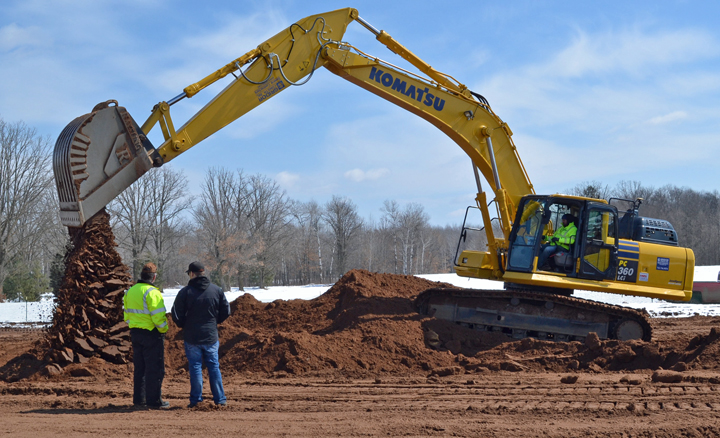
Local 49’s first-year apprentices earn anywhere from $24 to $34 per hour plus benefits, and receive their education at the union’s sprawling Hinckley training site, pictured above, at no charge.

Share
Operating Engineers Local 49 is hoping a new partnership with Minnesota Virtual Academy will draw more high-school graduates into the union’s registered apprenticeship program – and help meet future demand for skilled, trained workers in the heavy-equipment industry.
At the start of this school year, instructors from Local 49 began teaching for-credit courses open to high-school students statewide through the online, public school’s Destinations Career Academy.
Fifty-three students signed up in the first semester, and interest in the program has only grown since then. This semester 117 students from 66 school districts in 39 counties are enrolled, with notably high participation among girls.
“I think there really is an appetite not only from students but from parents and schools to really provide a relevant, meaningful career opportunity,” said Jenny Winkelaar, Local 49’s director of workforce and development. “Most schools who learn about it are promoting it because they don’t have the resources to operate this kind of pathway on their own.”
Like other career-pathway programs in the construction trades, Local 49’s courses introduce students to work in the industry, with a focus on concepts and skills that will prepare them for success as an apprentice heavy-equipment operator.
Offerings include construction exploration, basic grade and construction math, and construction-equipment maintenance and fundamentals. A prep course for getting a commercial driver’s license is in the works for next fall.
Triple the credit
But what makes Local 49’s partnership with Minnesota Virtual Academy unique among pre-apprenticeship programs is the potential to earn credit not just toward high school graduation, but also toward a post-secondary degree and journey-level certification. Minnesota Virtual School’s Leslie Lewandowski called it a “three-for-one” deal.
“They get high school elective credit, college credit and also credit toward their registered apprenticeship program if they sign on with a signatory contractor,” she said.
That’s a draw for students like Cole Snidarich, who was among the high schoolers enrolled in first-semester courses.
“The courses were a great opportunity for me to learn if I would be interested in a career in the construction field,” he said. “I would definitely recommend these courses for other high school kids considering working in the construction industry.”
Enrollment is open to students from any school district in the state. They can participate from anywhere they find an internet connection, at any time and at no cost to the student.
Rich Krohn, an instructor for the program, said he has enjoyed introducing students to careers operating the heavy equipment that builds communities.
“Fourteen weeks into the class and I still get comments from my students saying what a great experience it has been,” Krohn said. “I encourage all high-school students to sign up for the class and see what a career as an operating engineer has to offer.”
Virtual, with a hands-on twist
In addition to online classes, students participating in Local 49’s course will have opportunities to try out the union’s heavy equipment simulators, putting the concepts they learn in the classroom to the test. Winkelaar said COVID-19 has put in-person events on hold for now, but the union and its industry partners are working on plans to stage hands-on learning events across the state.
That level of investment shows just how serious Local 49 and its signatory contractors are about recruiting the next generation of heavy-equipment operators. For the Minnesota Virtual Academy, the program is an opportunity to showcase a career with good wages and benefits that many students might not otherwise consider.
Local 49’s first-year apprentices earn anywhere from $24 to $34 per hour plus benefits, and they receive their training at the union’s sprawling Hinckley facility at no charge.
“As we’re looking at pathways we want to offer students, we want them to be in high-demand jobs, so we’re spending our resources on career paths that warrant the investment,” Lewandowski said. “There’s need in this industry.”
“Historically, we have known that unless you knew somebody in the industry or came from a rural area, you might not have a lot knowledge about what opportunities look like in the heavy-equipment operating industry,” Winkelaar added.
Making an informed choice is an important first step, said Tom McCrossan, a contractor who sits on the Local 49 apprenticeship board.
“It is critical that students in high school learn about our industry early to see that this industry has many career pathways to different areas in the construction field,” he said. “Taking these courses gives students a great foundation for being a heavy equipment operator as well as other facets of our industry.”
Learn more
• Visit local49.org/operating-engineers-career-pathway-program.
• School districts interested in arranging a virtual meeting with Lewandowski and Winkelaar to discuss the program should email llewandowski [at] mnva [dot] org or jwinkelaar [at] local49 [dot] org.

